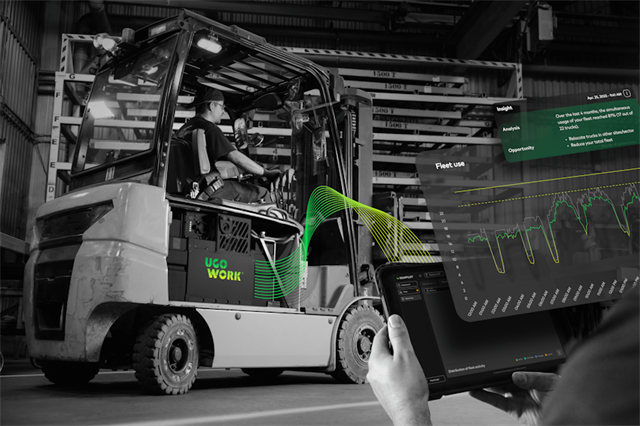 UgoWork cloud-connected lithium-ion battery in a counterbalanced forklift truck sending data to the UgoPilot software platform, which is displaying tangible insights on a tablet held by a manager standing on a factory floor
UgoWork cloud-connected lithium-ion battery in a counterbalanced forklift truck sending data to the UgoPilot software platform, which is displaying tangible insights on a tablet held by a manager standing on a factory floor
Every second counts in material handling processes. Meeting delivery deadlines, minimizing downtimes and keeping costs in check are constant pressures. Without the right equipment, these KPIs quickly fall off the track, impacting a business’ bottom line.
Yet many companies continue to rely on traditional power solutions, like internal combustion engines and lead-acid batteries, to move goods. While these technologies have served industries for decades, they also have major disadvantages that can undermine productivity, safety, cost control and have significant carbon footprints.
IC-powered forklifts: Power comes at a cost
Forklifts with internal combustion engines (ICEs) have long been valued for their raw power and ability to handle heavy-duty jobs. However, their dependence on diesel, natural gas, or propane has become a growing liability. Not only do these fuel types drive up greenhouse gas emissions but they also increase operational costs. Frequent refueling is time-consuming, fuel prices fluctuate, and regular engine maintenance is required to prevent breakdowns.
The drawbacks go beyond costs and downtimes. Exhaust fumes make IC forklifts unsuitable for indoor environments, posing health risks to workers and interrupting workflow in tight warehouse spaces. Moreover, the need for compliance measures, specialized refueling infrastructure that takes up space, and additional safety precautions further complicate operations.
Finally, ESG regulations, such as California’s Zero-Emission Forklift (ZEF) Regulation, means facilities must start upgrading their fleets with electric, zero-emissions forklifts.
Why lead-acid batteries can’t keep up anymore
Lead-acid battery forklifts have been a staple in warehouse operations, but their shortcomings are becoming more unavoidable for material handling teams running energy demanding applications.
For one, the need for large, designated charging areas takes up valuable shop floor space and limits flexibility in optimizing layouts for smoother workflows. Adding to the inconvenience is the labor required to swap batteries at the end of every work shift.
Long unplanned recharge times force operators to stop working, often for hours, bogging down productivity at critical moments.
The manual upkeep of water levels in lead-acid batteries adds to labor costs, as workers must frequently monitor, refill, and manage the risk of overflows. These maintenance tasks aren’t just time-consuming; they increase the danger of acid leaks and spills, creating potentially serious safety hazards that require additional protocols and training to manage effectively.
Switching gears to lithium-ion batteries
More companies are making the switch to lithium-ion batteries, driven by the urgent need for faster, cleaner, safer and more efficient material handling processes.
Lithium-ion batteries boast a lifespan of up to five times longer than lead-acid alternatives, thanks to their advanced chemistry and ability to withstand deep discharges and opportunity charging without significant capacity loss. Unlike lead-acid, which degrades rapidly when strict charge, discharge and maintenance protocols are not followed, lithium-ion maintains performance over thousands of cycles, without being impacted by usage patterns, reducing the need for frequent replacements.
What’s more, lithium-ion batteries are five times faster to charge—just minutes during breaks can keep forklifts running at full speed around the clock. This slashes downtime and maximizes throughput.
The advantages don’t stop at performance. Lithium-ion batteries eliminate the grueling and recurring maintenance associated with lead-acid systems. This shift lets operators focus on what matters most: keeping material handling teams safe and budgets in check.
Lithium-ion charging infrastructure also optimizes warehouse layouts. Gone are the bulky, space-hogging battery rooms that lead-acid systems demand. Instead, lithium-ion’s performance and fast charging allows for the battery to remain in the forklift all the time. This eliminates the need for a battery room and frees up valuable floor space for storage, improved productivity, or other revenue-generating uses.
The vendor difference: When lithium-ion performance falls short
While lithium-ion technology is widely recognized for its tremendous potential for powering forklifts, not all providers deliver the same level of quality or reliability.
Some vendors struggle to maintain consistent performance in extreme temperatures. This can be a major setback for operations that require constant uptime.
Also, many lithium-ion batteries lack critical certifications, like UL listing or OEM approvals, raising concerns about safety and compatibility with trucks. Without these assurances, companies may face compliance risks, potential equipment damage and may put their employees in dangerous situations.
Compounding the issue, some suppliers fail to provide adequate support when problems arise, leaving operators to troubleshoot issues on their own.
The UgoWork difference: Lithium-ion batteries for longer product lifecycles
In a class of their own, UgoWork’s UL listed and OEM approved lithium-ion batteries are designed to cover a broad spectrum of material handling needs, offering compatibility across 24, 36, 48, and 80V applications. Their universal configuration adapts to various forklift sizes and weights, which allows teams to perform battery swaps as forklift fleets change.
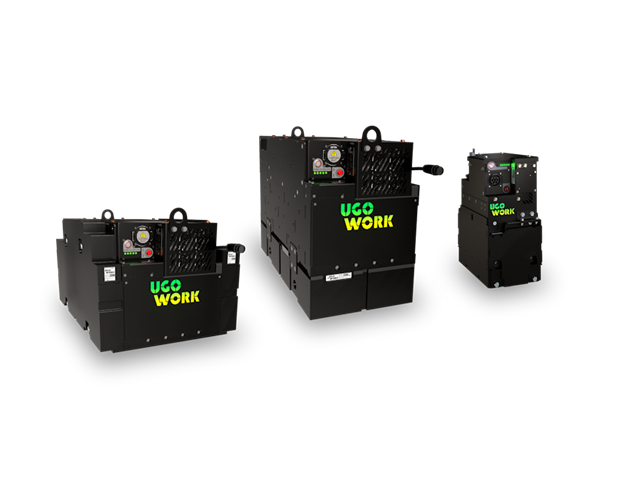 UgoWork's product lineup with adapting counterweight to fit all forklift size and minimum weight requirements
UgoWork's product lineup with adapting counterweight to fit all forklift size and minimum weight requirements
These batteries deliver consistent uptime, even in the most demanding conditions, thanks to a proprietary battery management system (BMS) and a smart thermal management system that keeps them running optimally under the harshest conditions—from high to extremely low temperatures.
Engineered for safe and easy use, UgoWork’s batteries feature an ergonomic design for easier handling. An intuitive user interface displays battery state and charge levels as well as generates sound alert warnings.
UgoWork’s high-speed, compact charging infrastructure promises ultra-fast recharging, while the embedded chargers and universal charging stations streamline processes for operators, since the charging interface is the most simple and ergonomic in the industry.
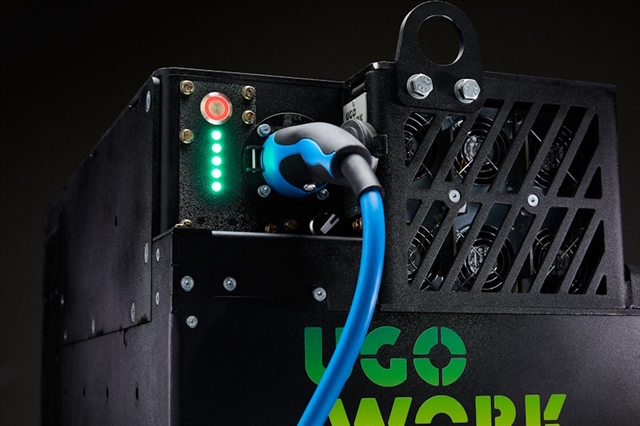 UgoWork's unique automotive connector and ergonomic user interface
UgoWork's unique automotive connector and ergonomic user interface
Another advantage? UgoWork’s groundbreaking OTA battery update process redefines proactivity by enabling remote firmware upgrades without any physical interaction. This innovative technology pushes updates directly to battery systems across entire fleets, keeping material handling equipment optimized and up-to-date, regardless of the location.
UgoWork’s battery enclosures can sustain the life of multiple battery packs. The refuelable NMC lithium-ion cells maximize the recycling value of materials like nickel, manganese and cobalt, reducing waste. All of UgoWork’s batteries can also be given a second life for other uses. Components can be responsibly disposed of thanks to a partnership with Lithion Technologies.
Where high-performance lithium-ion batteries are only the beginning
UgoWork doesn’t just deliver next-generation lithium-ion batteries—it offers an integrated, data-driven after-sales approach that truly sets it apart from other vendors.
At the heart of this is UgoPilot™, UgoWork’s proprietary cloud-based platform that continuously monitors battery health, charge levels, and operational efficiency in real time. UgoPilot gives fleet managers full visibility into battery performance, providing actionable insights to optimize energy use, extend battery life, and ensure uninterrupted operations. It’s a tool that empowers decision-making, helping to maintain peak performance and prevent unexpected disruptions.
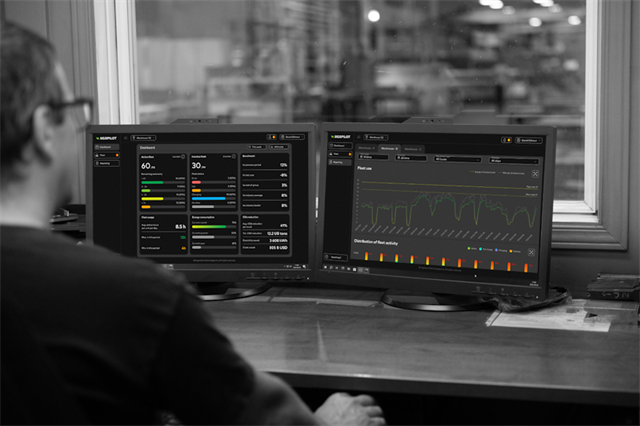 Manager in office overlooking factory and computer screens showing UgoPilot fleet management software dashboard and reporting
Manager in office overlooking factory and computer screens showing UgoPilot fleet management software dashboard and reporting
This proactive approach is complemented by UgoWork’s Customer Success team, which monitors battery performance alongside UgoPilot, runs remote diagnostics, and identifies potential issues, such as abnormal battery capacity or inconsistent charging patterns, before they compromise output. Customer Success experts offer hands-on support and personalized data insights so that clients can better manage a wide range of aspects regarding their lithium-ion batteries, including fleet rightsizing, grid peak shaving, battery life enhancement, CO2 credit support, and help with battery passport data.
UgoWork’s Energy as a Service: A smarter way to invest in lithium-ion batteries
UgoWork’s Energy-as-a-Service (EaaS) model redefines how companies manage forklift power by turning energy into a flexible, subscription-based service. Rather than buying and maintaining batteries, companies simply (and only!) pay for the energy they use, shifting to an OPEX model that reduces upfront capital costs. This pricing strategy frees up capital for other strategic investments. The monthly fee includes upgrades, round-the-clock monitoring, and full-service customer support.
But the benefits go beyond cost predictability. UgoWork’s EaaS means businesses always have access to the latest innovations in lithium-ion technology—again, without having to plan for additional CAPEX.
When transitioning from internal combustion or lead-acid to lithium-ion forklifts—or when reassessing current lithium-ion providers—fleet managers need more than powerful batteries. They need a partner that delivers the full package: advanced lithium-ion technology, comprehensive support, and a flexible business model tailored to operational needs.
UgoWork offers precisely that, with a coordinated, data-driven, and service-oriented method that redefines how fleets are powered. By choosing UgoWork, companies can embrace a future-proof forklift battery solution that makes smart business sense.
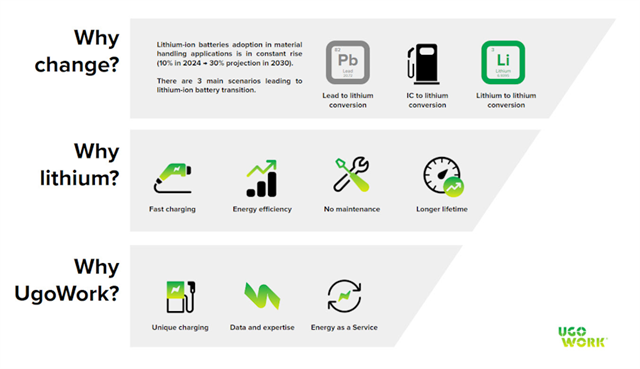 Funnel representation of a transition from legacy power sources such as lead-acid and internal combustion to lithium-ion, then to UgoWork batteries for material handling applications
Funnel representation of a transition from legacy power sources such as lead-acid and internal combustion to lithium-ion, then to UgoWork batteries for material handling applications